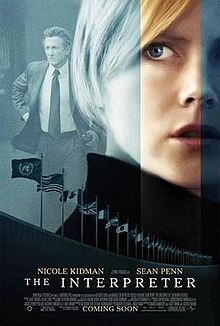Tags
assasination, Catholic, cinema, death penalty, ethnic cleansing, faith, holocaust, killing, mass killing, ministry, movie, movie ministry, Nicole Kidman, Sean Penn, The Interpreter
So, a movie that struck me the very first time I saw it was The Interpreter. Both of the main characters have suffered severe loss. An overheard conversation of an assassination attempt bring together these two suffering souls. It’s an interesting story and an exciting thriller, but what really got me, was this story Nicole Kidman’s character, Silvia Broome, tells Sean Penn’s character, Tobin Keller.
Keller talks about wishing death on the man who killed his wife (auto accident) and Broome responds by telling him of this African tribe who handles murder in an interesting way. When one person in the tribe kills someone, they are bound and taken out into the river and thrown in. The victim’s family is given the choice of whether or not they are willing to jump in to save the killer. Their belief is that in saving the killer, the victim’s family will heal, but if they choose to let the killer die, they will grieve forever.
This is a great way to breach the topic of the death penalty. Not only do you have the story of the tribe, you have the loss suffered by Keller & Broome, but also a character who’s been threatened with assassination for holocaust type crimes against the people in his country. Who deserves the to die for their crimes? Christian teaching would say none of them… Why?
It’s also a good way to talk about the differences in the culpability of the killers. The first, was presumably a real accident. What is his level of fault? What if he did it on purpose? Another victim is shot by a child being raised to kill. And the last killer has killed hundreds if not thousands by his orders, even if he himself wasn’t holding the gun.
Keller refers back to the story of he tribe several times throughout the rest of the movie, wavering back and forth on what choice he would make. So it’s interesting to see him change as his experiences change and as he deals with his grief. It adds a dimension to the story that probably isn’t necessary for the movie to be good, but definitely makes it one to think about.
This story is fictional, but has so many similarities to things going on in Zimbabwe, so much so that it was banned there. How aware are we of what goes on outside the borders of our country – or our continent? Does knowing that this stuff actually happens change your opinion about the punishment the killers deserve? What, if any, ways can we help stop this sort of thing from happening?
This is one of my favorite movies so it shouldn’t be a surprise that this is one I highly recommend if you ever get a chance!

